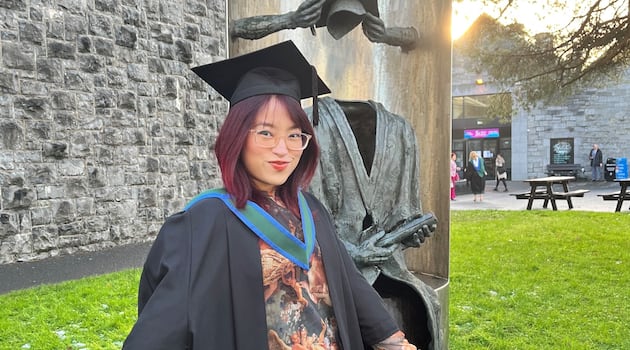
International students have shared their experience of studying and living in Ireland with the Irish Times.
Most students, out of more than a dozen interviewed, had very thought-through reasons for choosing Ireland for study, but one student remains perplexed about what compelled her to move halfway across the world for college.
Amelia Rosevear, 22, from Reno, Nevada in the US, says she is still, “not entirely sure” why Ireland won her over, given she had ”no prior lineal connection, let alone any familiarity with the place, its people, or its institutions”.
For Adetunji Adeleke, 31, from Oyo town in Nigeria, one phone call was all it took to convince her to uproot her family and move to Galway.
“At the time, I was deciding between a PhD in the US or Ireland. A conversation with my prospective supervisor changed everything for me,” she says.
“I felt that my supervisor had the necessary skills to supervise my PhD and that she was very interested in my research proposal. I have read about many people dropping out a PhD because they had a bad supervisor, so her enthusiasm and skills swayed my decision.”
Brexit was the deciding fact for Nicólo Bianchi, 23, from Milan, Italy and Maria Gutierrez, 22, from Blanes, Spain, to come and study in Ireland. They had both wanted to study in the UK, partly to improve their English, but Brexit made that unfeasible and too expensive. They both say they had heard how friendly people were in Ireland, so it was a natural choice.
That Ireland is an English-speaking country in Europe also influenced Glory Omamase, 39, from Nigeria, and Vibeth Porras, 39, from Bucaramanga, Colombia, decisions to move here, though they chose it over Britain for other reasons.
Kiran Singh, 31, from Los Angeles in the US, is studying Medicine at Trinity College Dublin
Omamase, “wanted a quiet country. The UK seemed a bit too popular” while Porras was convinced by the terms of her student visa which, “allows for part-time employment which helps cover living expenses during my studies”.
For Annie Mackey, 22, from Connecticut in the US, it was a chance to make up for opportunities missed during the Covid pandemic.
[ Advice on life in college: ‘Always start writing that report earlier than you think you need to’Opens in new window ]
“I was unable to a study-abroad during my undergraduate degree due to Covid, but had always wanted to. I have family here and it feels close enough to home, so it I felt it was a great place for me to come and do my masters.”
For Kiran Singh, 31, from Los Angeles in the US, the decision to study in Ireland was largely financial. She chose to do a masters in Molecular Medicine and then study Medicine at Trinity as both programs were “significantly more affordable compared to similar options in the United States”.
Vibeth Porras, 39, from Bucaramanga, Colombia is studying a masters in International Development Practice NUIG
Every student spoke in glowing terms about the people they had met here.
Porras talks of the “warmth and friendliness of the Irish people” while Bianchi loves “the friendliness of the Irish people” and Phu Pham, 26, from Can Tho City in Vietnam, finds “people here are genuinely warm and open, which made adapting much easier”.
More specifically relating to her university experience, Gutierrez, who read Business and Computer Science at Trinity College, says she, likes Trinity’s layout, ”being a campus where everyone is in the same place as you are always bumping into your friends”.
Bianchi, who studied English and History at UCD, says she “really appreciated” how her classes were organised into lectures, tutorials or small seminars, “as in Italy we would only have lectures”.
Omamase, who undertook a masters in International Development at NUIG, says she values how “lecturers actually pay attention to you and are willing to help”.
Agreeing with this assessment is Adeleke, who is doing a PhD in Economics at University of Galway, saying: “In my discipline the faculty members are generally approachable, and everyone seems to be ready to help at all times”.
A few of the students say they appreciate living in Ireland for its low crime levels. Porras says she feels “the country is generally calm and safe”. While Omamase compared Ireland to her native Nigeria and concluded: “It seems safer than my country”.
Nicólo Bianchi, 23, from Milan, Italy, studied English and History at UCD, and is now pursuing a master’s in Political Science at Trinity
In addition to safety, several students say they really value the speed and ease with which they could reach nature in Ireland. Rosevear treasures her ability to quickly, “get to the sea or the hills” from Dublin city, “depending on what the sun (or lack thereof) decided for me”.
Similarly, Lúling feels that “access to nature and the sea was really important” during studies, in order to “find a good balance”. While Porras, who lives in Galway appreciates, “the historical castles and stunning landscapes” on her doorstep.
Two topics dominate the conversation when it comes to discussing any difficulties that students had encountered while living in Ireland: the cost of living and the housing crisis.
Mackey was surprised to find that, “housing in Dublin is comparable in price to Boston and New York City”. Meanwhile, Omomase had a similar experience on the west coast: “Back home I lived in a two-bedroom apartment by myself. In Galway I could only afford to rent a single room in a shared house”.
[ International student numbers in higher education climb to new highOpens in new window ]
Guiterrez recounts how in her second year at Trinity she had to “crash on people’s couches for the first month of college” after she couldn’t find a place to live. “Thankfully, after two weeks, Trinity let me stay in one of the student accommodations until I found a place, but the stress and not knowing where I’d be living was awful.”
Sourav currently finds himself in a similar position. He has been given an oral notice to vacate the room him and his wife are renting in a house share and is struggling to find new accommodation. “We are expecting and my wife is truly worried that we will not be able to find suitable accommodation for us and the baby as the search for someone new to rent has been a nightmare. I found most agents/ landlords do not reply to my emails or WhatsApp messages.
“When I do get responses, they always ask to see my payslip and when I show them the stipend I get from the university they are not satisfied. There are also lots of scams out there and we feel very vulnerable right now.”
Raisul Sourav is studying for a PhD in Law at NUIG
While Adeleke currently spends 62 per cent of his university stipend on accommodation, he admitted that “in all the houses I have lived in here, the landladies and landlords have been lovely”.
The high price of rent is a big contributing factor to the high cost of living that many report struggling to meet. Though Porras can work a part-time job on her visa, the conditions of her visa stipulate that she can only work 20 hours a week and, “it can be hard to cover expenses beyond rent and basic needs. This often leaves little room for recreational activities or dining out.”
She also says finding a job on a student visa difficult as you need to have a PPS number to work, but “you can only apply once you have a job offer. The number can take three to four months to come, and this can create a challenging cycle for newcomers”.
At times over her four years in Dublin, Rosevear says she found that the city “felt unlivable”. “The few jobs that can be kept up while being a full-time student are rarely sufficient to cover the costs of rent and groceries, etc. I felt my time at university became more and more financially orientated.”
Some students from ethnic minorities report having experienced racism in Ireland. Sourav said that some of the local young people in his neighbourhood, “create regular disturbances” around their home “like shouting racist slurs, throwing balls intentionally to our door and pointing us out as being Indians”.
Singh says that she “experienced more racism in Ireland than I ever did in the US, Canada, Germany, or Spain – even though I’ve travelled to over 32 countries”.
Though Omamase says she has loved her time in Ireland, she “thinks the populace is becoming fed up with foreigners so I wouldn’t advise anyone back home to come here”.
[ English language schools call for pause on new rules on financial demands for international studentsOpens in new window ]
When asked if they would recommend studying in Ireland to friends and family back home, some students conditioned their recommendation on the perspective students financial circumstances.
Adeleke would recommend studying in Ireland to students with “no family” to support. Pham advises anyone coming to Ireland to study to, “plan carefully for living costs” and Gutierrez “would definitely recommend studying in Ireland to people who can afford it”. While Porras advises people moving to Ireland to try to have a support network or friend already here as “arriving alone can be very challenging, particularly with the housing situation”.
However, many students unreservedly recommend Ireland as a place to study.
“It was the best decision of my life to move to Dublin,” says Lúling. Sachin Yadav, 29, from Noida in India would, “wholeheartedly recommend Ireland to anyone considering studying abroad” and Mackey would “100 per cent” advise her friends and family back home to come and study in Ireland.
Despite the racism that Sourav has faced from members of the local community here, he still, “recommends studying in Ireland to my friends and family back home”.
Though there is no singular reason why the students decided to come and study in Ireland and no universal international student experience, clear patterns did emerge from talking to students about their experiences.
While international students faced many of the same challenges that Irish students do in terms of the cost of living and price of accommodation, their struggles are exacerbated by their smaller support networks and unfamiliarity with the systems here.





